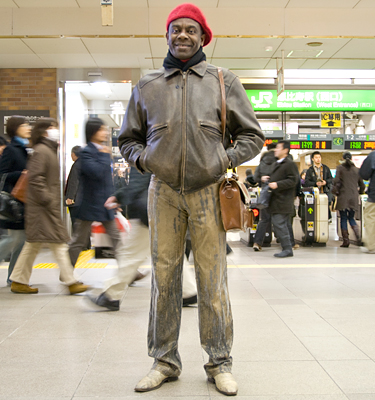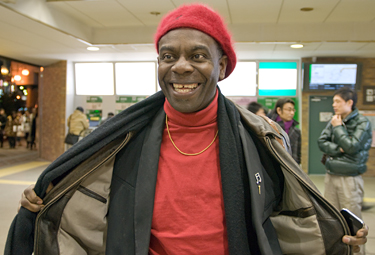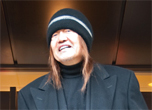
Posted: Mon Feb 22 2010
Wayne Neil, Singer-Songwriter
Do you often come to Ebisu?
WN: I often come to see friends play live. Plus, there’s an Irish pub that‘s only a short walk from Ebisu station called What the Dickens! that always puts on a live performance to draw the crowds at weekends – including plenty of foreigners.
That’s a nice hat. Is red your favourite colour?
WN: It’s one of them. Vivid colours make people feel happy!
Japanese people tend to normally wear plainer, more subdued colours …
WN: The men do! They pretty much wear only black, white, grey, brown or navy; they look monochromatic. On the other hand, women here in their 30s to 50s seem to take more pride in their fashion, realising that the right clothes can make them look more attractive. When it comes to fashion in Japan, the men simply can’t compete with the women! Every day I hear the noise of guys dragging the soles of their badly fitting shoes along on the pavement! [Laughs]
Where are you originally from?
WN: From the Co-operative Republic of Guyana. Do you know where that is? [Laughs] It borders with Brazil and Venezuela and is the only country in South America to have adopted English as its official language. Without its own embassy or consulate in Japan, it shares those of the Republic of Trinidad and Tobago; and as far as I know, I’m the only person from Guyana here – although I do have friends here from Trinidad and Tobago.
What brought you to Tokyo?
WN: I’m a singer-songwriter. I met a Japanese woman in Los Angeles who invited me to Japan. At the time I was based in Amsterdam; however I was actually looking for a change – looking to leave Europe. I felt I needed to travel to avoid getting stuck in one frame of mind. The more people travel the more they come into contact with other cultures; I think the more experience a person has, the more flexible they become.
Have you grown accustomed to Japanese culture?
WN: I’ve lived in Tokyo for 12 years; it’s such a safe country. My place is in Hachioji. I’m really used to the neighbourhood there and think I blend in pretty well– the trick is to never speak badly of people behind their back, even if you think they’re wrong.
Do you like performing in Japan?
WN: I love it. I perform in various places. Japanese people don’t understand the English words – often they can’t understand the words – but they feel the music with their hearts. Some people, despite not understanding the actual words, listen to my love ballads and cry. The songs touch people’s hearts.
Do you ever think to learn more Japanese?
WN: Japanese is all around me. In a way it's a shame, but most of it just flows over me. [Laughs]
More from Wayne:

‘Japanese was the nineteenth country I’ve visited: Korea the twentieth. When I first came to Japan, I never imagined I’d actually end up living here’
‘My existence here is unique. I’m just one soul amongst 120 million Japanese people. Because of this drop-in-the-ocean-like existence, I want to travel all over Japan, meeting and performing for different people. There’re lots of people outside of Tokyo who’ve only seen people with black skin on TV!’
‘One love! We’ll meet again!’
Tags:
Tweets
- About Us |
- Work for Time Out |
- Send us info |
- Advertising |
- Mobile edition |
- Terms & Conditions |
- Privacy policy |
- Contact Us
Copyright © 2014 Time Out Tokyo














Add your comment